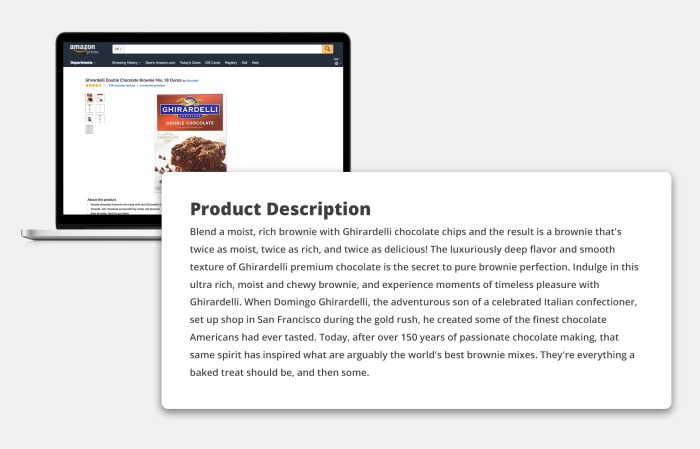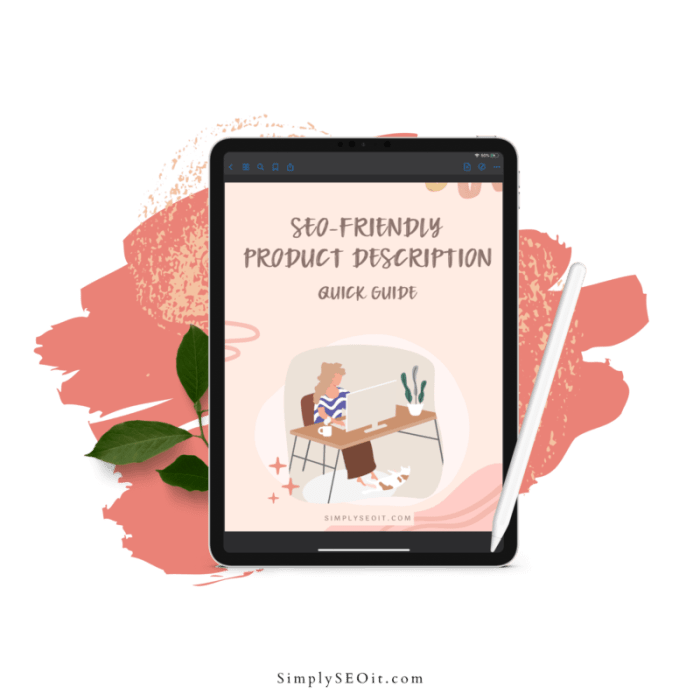Product Descriptions Guide sets the stage for this enthralling narrative, offering readers a glimpse into a story that is rich in detail with American high school hip style and brimming with originality from the outset.
Get ready to dive into the world of product descriptions, where words have the power to drive sales and enhance your online presence.
Importance of Product Descriptions
In the world of e-commerce, product descriptions play a crucial role in attracting customers and driving sales. A well-crafted product description can make a significant impact on a buyer’s decision-making process and ultimately lead to a purchase. Let’s dive into why product descriptions are so important for online stores.
Enhancing Customer Experience
- Product descriptions provide vital information about the features, benefits, and specifications of a product, helping customers make informed purchasing decisions.
- Clear and detailed product descriptions can enhance the overall shopping experience, making it easier for customers to understand what they are buying.
- Engaging product descriptions can create an emotional connection with customers, evoking desire and excitement about the product.
Boosting Performance
- Optimizing product descriptions with relevant s can improve the search engine ranking of an online store, driving more organic traffic.
- Well-written product descriptions can increase the visibility of products in search engine results, leading to higher click-through rates.
- Unique and compelling product descriptions can differentiate a store from competitors and attract more potential customers.
Tips for Creating Compelling Product Descriptions
- Know your target audience and tailor your product descriptions to resonate with their needs and preferences.
- Highlight the key features and benefits of the product in a concise and engaging manner.
- Use descriptive language, storytelling, and sensory details to create a vivid picture of the product in the customer’s mind.
- Include social proof, such as customer reviews or testimonials, to build trust and credibility with potential buyers.
- Optimize product descriptions for by incorporating relevant s naturally throughout the content.
Components of an Effective Product Description: Product Descriptions Guide

When it comes to crafting a compelling product description, there are several key elements that should be included to attract potential buyers and drive sales. Let’s explore the essential components that make up an effective product description.
Key Elements of a Product Description
Before diving into specific examples, it’s important to understand the basic components that should be present in every product description, regardless of the type of product being sold.
- Product Name: Clearly state the name of the product to ensure customers know exactly what they are looking at.
- Description: Provide a detailed description of the product, including its features, benefits, and any unique selling points.
- Specifications: Include relevant technical details such as dimensions, materials, and any other pertinent information.
- High-Quality Images: Accompany the description with clear and appealing images that showcase the product from different angles.
- Pricing: Clearly display the price of the product and any discounts or promotions that may apply.
- Call-to-Action: Encourage customers to take action by including a clear call-to-action button, such as “Shop Now” or “Add to Cart.”
Product Descriptions Across Different Categories
While the basic components remain consistent, product descriptions may vary depending on the type of product being sold. Let’s compare and contrast product descriptions for electronics, clothing, and food items.
| Electronics | Clothing | Food |
|---|---|---|
| Focus on technical specifications and performance. | Highlight fabric, fit, and sizing details. | Emphasize ingredients, flavors, and cooking instructions. |
Examples of Standout Product Descriptions
Successful product descriptions stand out by being both informative and persuasive. Let’s take a look at some examples of product descriptions that effectively balance these two elements:
-
“Unleash your creativity with our state-of-the-art digital camera, featuring advanced imaging technology and intuitive controls. Capture every moment in stunning detail and elevate your photography game to new heights.”
-
“Elevate your style with our premium denim jeans, crafted from the finest materials for a perfect fit and ultimate comfort. Stand out from the crowd and make a statement with every step you take.”
-
“Indulge in the rich flavors of our handcrafted artisanal chocolates, made with the finest ingredients sourced from around the world. Treat yourself to a sensory experience like no other and savor every decadent bite.”
By combining descriptive language with persuasive storytelling, these product descriptions effectively communicate the value of the products while enticing customers to make a purchase.
Writing Style and Tone

When it comes to writing product descriptions, the style and tone you choose can greatly impact how effectively you can sell your product. Your words have the power to persuade, engage, and ultimately convert a potential customer into a buyer. Here are some tips to help you nail the right writing style and tone for your product descriptions.
Choosing the Right Tone
Before you start writing, consider the type of product you are selling and the audience you are targeting. Different products require different tones to effectively communicate their value. Here are some general guidelines:
- Formal Tone: Ideal for luxury or high-end products where sophistication and elegance are key selling points.
- Playful Tone: Great for products aimed at a younger audience or those with a sense of humor. Think quirky, creative, and fun!
- Technical Tone: Suited for products that require detailed explanations or specifications. Use industry-specific jargon to showcase expertise.
Storytelling Techniques
Using storytelling in your product descriptions can create an emotional connection with your audience, making them more likely to make a purchase. By weaving a narrative around your product, you can tap into the power of emotions and imagination. Highlight the benefits and unique features of your product through a compelling story that resonates with your customers.
Language for Target Audience
Your choice of language should be tailored to your target audience’s preferences and demographics. Use words and phrases that your audience can relate to and understand. Whether it’s using slang, formal language, or technical terms, ensure that your product descriptions speak directly to your customers. This personal touch can make all the difference in converting a visitor into a loyal customer.
Formatting and Layout
When it comes to structuring product descriptions, it’s crucial to consider the readability and engagement of your content. Here are some best practices to keep in mind:
Bullet Points, Paragraphs, Headings
Using bullet points can help highlight key features or benefits of a product in a concise and easy-to-read format. Paragraphs, on the other hand, are great for providing more detailed information or storytelling about the product. Headings can be used to break up the content and make it easier for users to skim through the description.
Short vs. Long Descriptions
Short product descriptions are effective for providing a quick overview of the product, while long descriptions allow for more in-depth information and storytelling. The length of the description should depend on the complexity of the product and the buying behavior of your target audience.
Multimedia Elements, Product Descriptions Guide
Including images and videos in product descriptions can enhance the overall user experience and provide a visual representation of the product. High-quality images and videos can help customers better understand the product and make informed purchasing decisions.
Optimizing for Mobile Devices
In today’s mobile-centric world, it’s essential to optimize product descriptions for mobile devices. Keep the content concise, use short paragraphs, and ensure that images and videos are responsive and load quickly on mobile devices.






